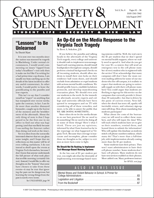Express Yourself: Free Expression on College Campuses
Author: JoAnna Raucci.; Dennis Gregory.
Source: Volume 18, Number 02, Winter 2017 , pp.31-34(4)

< previous article |next article > |return to table of contents
Abstract:
The right to free expression would seem a fairly uncontroversial principle in a country governed by a Constitution that enshrines free speech as a core right and value. And nowhere would one expect to find greater respect for the right of free expression that in colleges and universities, institutions dedicated to the discovery and preservation of truth and knowledge. Nevertheless, the existence of “speech codes,” “trigger warnings,” and “safe zones” suggests that other rights—privacy rights, safety and security, multiculturalism—may, in their exercise, be found to be in conflict with or incompatible with the unrestrained right to freely express one’s ideas on campus. Indeed, speech and expression are difficult concepts to enact into law, as they often include both a person’s intent and circumstantial issues that are based more on speculation than on evidence. As campus environments have begun to include students with a variety of perspectives and backgrounds, it became much more complicated to continue promoting free expression for students while also keeping the campus safe and comfortable for minorities and other marginalized groups. This article examines the issue of free expression in the surprisingly contentious environment of today’s higher education communities. Specifically, it explores how the right to free expression is sustained at public colleges and universities, which have unique considerations in regard to their responsibility as public environments; and how the right of free expression on private campuses can be vastly different. The authors survey the challenges, restrictions, and backlashes over freedom of speech on campus, how campus protest has contributed to the development of our current contemporary standards for campus speech, and how those standards may be changing as speech collides with other rights students and faculty may also value. Cases cited include Sweezy v. New Hampshire; Doe v. University of Michigan; Chaplinsky v. New Hampshire; Cohen v. California; R.A.V v. City of St. Paul; Papish v. Board of Curators of the University of Missouri; United States v. Baker; United States v. Alkhabaz.Keywords: Fighting Words and Harassment; Profanity; Obscenity; Hate Speech; “Free-Speech Zones;” Online Expression; The FIRE Survey
Affiliations:
1: University of Mary Washington; 2: Old Dominion University.